Why I Pick Up Plastic Garbage at the Beach
How the Futile Becomes the Possible
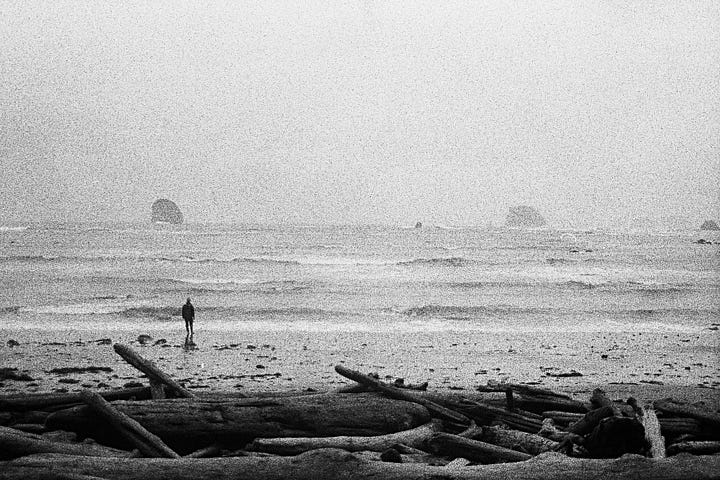
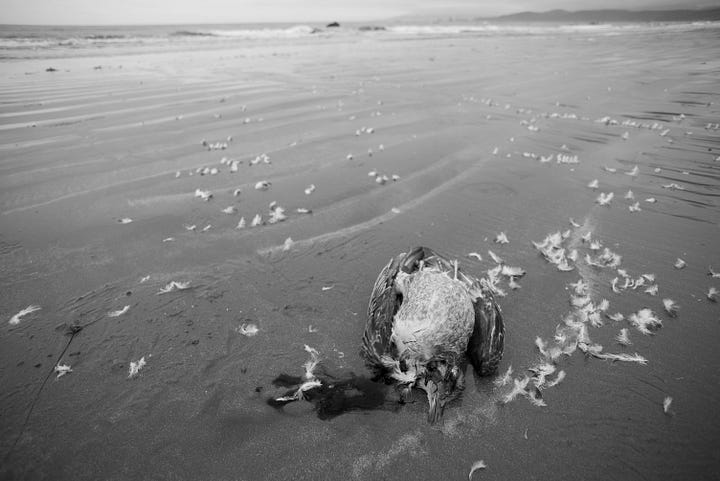
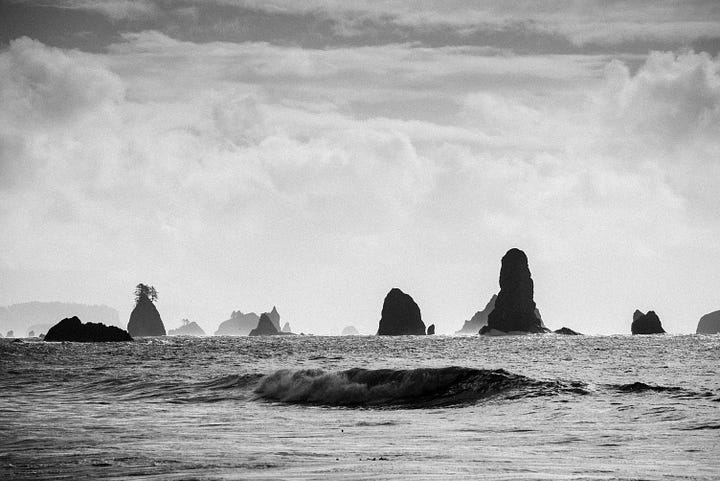
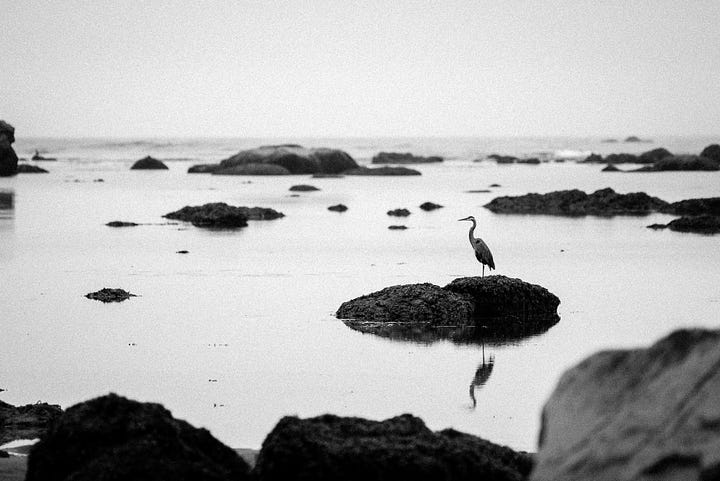
Welcome! I’m Max Wilbert, the co-author of Bright Green Lies: How the Environmental Movement Lost Its Way and What We Can Do About It and co-founder of Protect Thacker Pass. This newsletter focuses on sustainability, greenwashing, and resistance. You can subscribe for free. Paying for a subscription supports my writing and organizing work, and gets you access to behind-the-scenes reports and unreleased drafts.
This piece is an homage to Brian Doyle, master of the run-on-sentence, lover of the Pacific, and author of several of the most wonderfully unique books I’ve ever read: The Plover and Mink River. As such, it’s a different writing style than most of my writing. It was originally published in 2021, and I’m sharing it now in preparation for another piece I’m putting the finishing touches on.
Plastic and The Great Dance
Each year I make my pilgrimage to the ragged edge of our continent.
Walking trails through thick forest, I emerge through tangles of driftwood logs, some old and thick as time, tossed and tumbled by winter high tides, onto the wild Pacific beaches open to the pounding surf and thick mist.
I breathe in the salt wind. Seagulls swirl overhead and sandpipers swerve and tumble onto the beach. Water throws itself against stone in a dance old as the world. Amid the wild tumultuous beauty and the thundering of the surf, I smile.
But my peace is imperfect. There is the glint of plastic on this beach; fragments of this and that, remnants of fishing equipment lost in a storm, and when my eye catches this I am dragged back to our crisis.
Crinkled plastic water bottles, thick plastic fishing floats, polypropylene rope, cracked 5-gallon buckets, single sneakers and flip flops and sandals, empty pill bottles and automotive oil jerries, crumbling blocks of Styrofoam, nurdles, toothbrushes, a frayed orange immersion survival suit, combs, nets, buoys, and every other plastic doo-dad and crumbling fragment you can imagine. Once, a year after the tsunami in Japan, an entire hot tub floated the width of the Pacific Ocean and appeared on this beach.
Nowhere on this planet is immune from the harms of industrial civilization. Not the tops of the highest Himalayan Peaks where monsoon winds bring microplastics in a rain. Not the depths of the deepest oceanic chasms, the greatest wilderness on Earth, where the whales sink when their time has come and feed a rich slurry of life, most of it never seen or named or even imagined by human beings, where whole fantastical ecologies are no more than a dream to our land-bound minds, where toxic chemicals gather in deep slurries. And certainly not this shoreline of the Pacific Ocean, where the driftwood shrinks every year, a mirror held to the dwindling toothpick forests behind the beauty strip, where chainsaws rev and log trucks rumble, and where winter currents carry a million tons of plastic to grind themselves on the stones of this wild shore.
I stoop, pick up a fragment of water bottle, and stuff it in a pocket. It feels futile.
Is there an industrial-scale technology that can solve the plastic problem created by industrial technology? Should we deploy vast sweepers like oceanic push brooms, combing through the surface of the oceanic soup, filtering out the plastics to be gathered on land and buried away safely?
The problem is that the same currents which concentrate plastic in certain ocean regions also concentrate the plankton and the pleuston, the oceanic life that exists in the top layer of the water of the world, floating and swirling through remote corners of the ocean: velella velella the little carnivorous sail and exocoetidae (flying fish) and chains of jet-propulsion salps and planksters and sea slugs that cling upside down to the surface of the ocean and jellyfish with 100-foot long deadly tentacles and the holoplanktonic Janthina pallida floating snail and krill and copepods and eel eggs and barnacles who make their own rafts out of bubbles. The neuston has visitors too, sharks and whales and marlin and seabirds and tuna and Molidae sunfish, the most recent discovered just five years ago. If you can miss a 4,000-pound fish, who else have we overlooked in the wide ocean?
The wind gusts, and suddenly I am back on the beach, surrounded by wild beauty¬—and by plastic. It offends me; this plastic that should have stayed oil, this oil that should have stayed in the ground, this petrochemical industry garage sale spread out across the beach, choking out seals and fish and filter-feeders and birds and imaginations. So I gather what I can, trying to sort out what might be most dangerous, most likely to ensnare a neck or imitate a jellyfish or break into a thousand tiny plankton-like fragments, and I pack it into my backpack, and I carry it miles back on the trail through the thick forest, and I toss it in a trash can.
From there, it will join the mountains of plastic that industry spins in their petrochemical looms, and is then used and discarded, and the trash industry gathers into piles and calls “safe.” Is a garbage dump safe? Not as safe as a wild shoreline, where berries practically hurl themselves into your mouth and wildlife is thick in the forest and surf.
There are so many excuses to leave the plastic behind: it is smelly. It is sandy. It breaks into fragments and sticks to the fabric of my clothes and my backpack. But perhaps the best excuse is that I am simply moving trash from one place to another. But sometimes one place is better than another. Isn’t it? Haven’t we decided, somehow, that certain places will be sacrifice zones and we will pile plastic on them, dirty diapers and oil filters and hubcaps and rotting pizza boxes and moldering sweaters, and then pile up dirt on top and try to forget it ever happened? Or was this decided for us?
What is one person’s personal effort worth in a world of 7.8 billion souls, consuming, procreating, trashing, driving, expanding, paving, swallowing and converting wild land into sanitized suburbs? What is 20 or 30 pounds of trash a year to an ocean that receives a million times as much every year? It would be just as good to do nothing.
I wish that my lone actions would reverse the tide. I wish that the plastic would stream back off the beaches, plucked by waves and wind and carried into the swirling ocean currents, whizzing out of the water and back into freighters and trawlers and haulers in a tidal wave of plastic, squirming back into factories and supply chains, worming back into extruders, flowing in a sludgy river back into refineries and chemical plants, thinner now back into pipelines and tankers and train cars, pumping steadily back into oil wells and frack wells and tar sands deposits, back deep underground where it is safe and quiet and time is measured in millions of years, sand and dirt and trees lifted back into place by bulldozers running in reverse, dessicated soils turning moist, streams reappearing, elk and deer and wolves bounding back from where they have been banished, springing out of leghold traps, hunters putting the skins back on their last wild carcasses and wild beings running to join their families and their land, humans emerging from their villages to partake in the wild feast of creation, everyone feeding everyone else, the land sheltering all in her motherly breast.
Impossible. Irreversible. Unstoppable. Time will never run backwards. The god of progress will never be abandoned. People will never learn to be content with what they have, they will always need to fill their void with empty products, empty cars, empty houses, empty sex, empty consumption for empty souls.
But why does it have to be this way? Why can’t our dreams be the guide for our politics? Why can’t we abandon what is not working and return to the dance of life and death, and dance of give and take, the dance of people and deer, people and berries, river and fish, people and river, land and river, people and land, the sacred dance that all our ancestors danced and that has not been forgotten but waits quietly in the corner of our minds?
So I pick up trash, and I place it in my backpack, not because I alone can clean the beaches, although every being saved is one more participant in the great dance. My picking up plastic is a ritual. It is an act of devotion, a prayer, a cry into the darkness. It is a responsibility, a sacrifice. It is a promise. A payment on a debt owed. For each piece of trash I pick up, each throat-choking stomach-filling chemical-leaching never-degrading piece of plastic, I have to pass by a hundred more that are too big, too tangled, too buried, too many to fit in my pack, that remain un-picked up, and my heart breaks, and my emotion swells, and I dream of plastic factories moldering, and oil derricks rusting, and highways crumbling, and people living with land where berries practically throw themselves into your mouth. And I imagine the great dance, and I work to make it so.



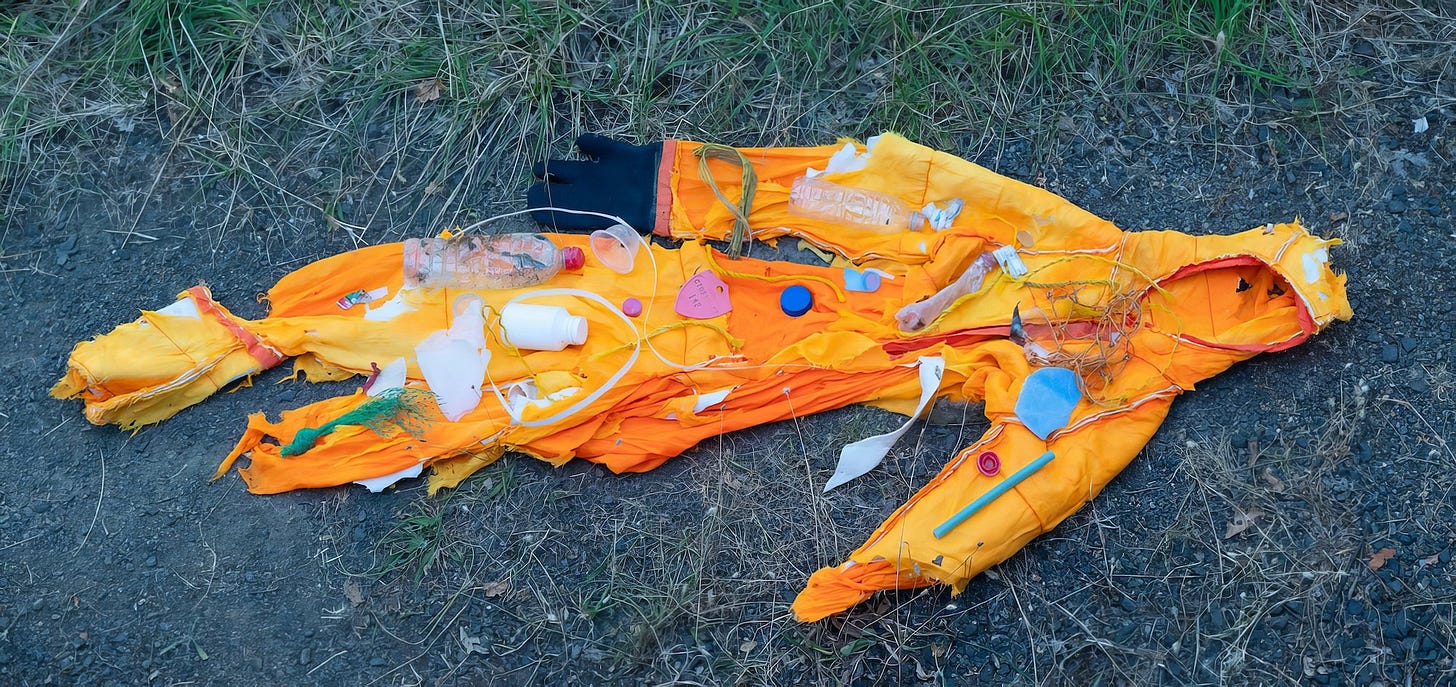
"Exactly how much plastic humanity has produced thus far, we’ll never know. But scientists have taken a swing at an estimate: more than 18 trillion pounds, twice the weight of all the animals living on Earth. Of that, 14 trillion pounds have become waste. Just 9 percent of that waste has been recycled[1], and 12 percent has been incinerated[1]. The rest has been landfilled or released into the environment, where each bag and bottle and wrapper shatters into millions of microplastics. … There’s so much plastic pollution out there that if you were to gather it all up and turn it into cling wrap, you’d have more than enough to cover the globe."
From "A Poison Like No Other: How Microplastics Corrupted our Planet and Our Bodies," by Matt Simon
i felt the emotion in the last paragraph.
this weird habit of picking up trash became a thing between me and my 5yo daughter,
i'm baffled that for her is quite natural and even fun...
for me? i'm more with you...it's like a dark ritual, certainly not fun...just look at my face here where i did not know my wife was taking a pic https://tinyurl.com/3d2zny9n